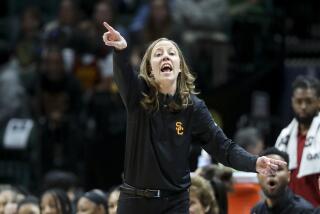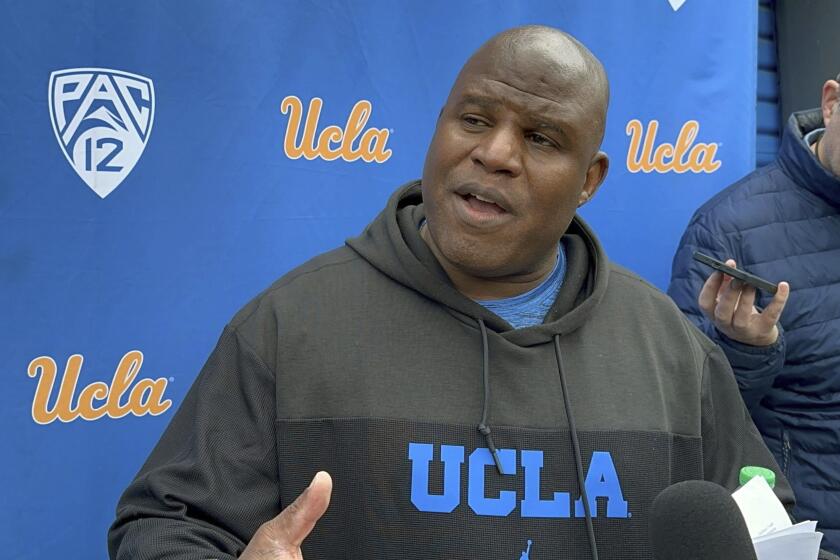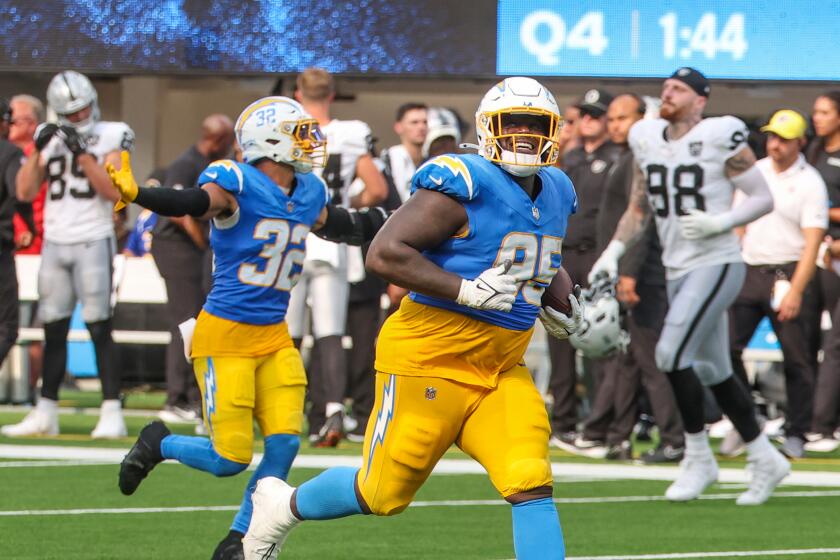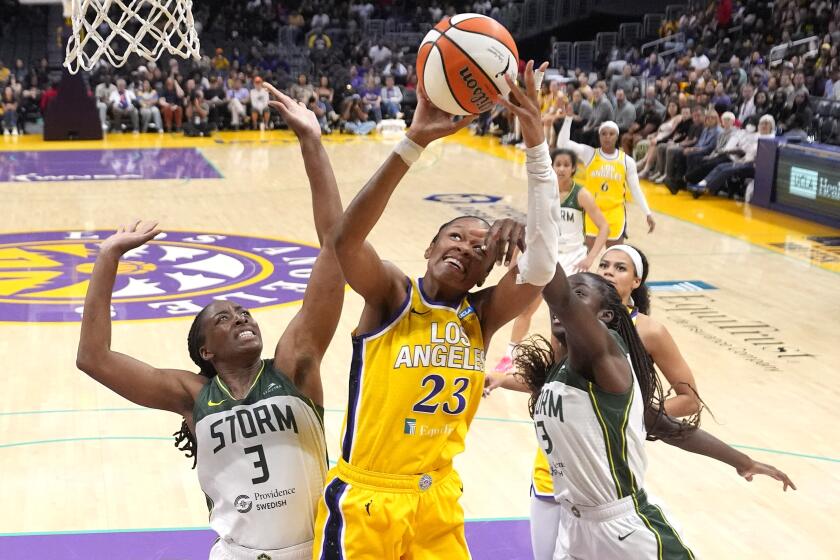For four seasons, Ally Prisock has done all the right things for the USC women’s soccer team
As USC women’s soccer coach Keidane McAlpine drifted through clusters of players, alumni and parents in the shade outside McAlister Stadium, three parallel moments struck him.
A pattern of praise from different parents for the same player — senior center back Ally Prisock.
Each had a freshman daughter whose transition onto the team was eased by Prisock. She sought their company, noticed their plights and consoled anyone who was down. As the group ate tacos from a food truck stationed nearby at Senior Day’s post-game tailgate, a shutout of Long Beach State on Sept. 14, the parents shared their appreciation with McAlpine.
“It’s a testament to her,” McAlpine said, “her decision to really make sure that all of these players understand what it means to be here and do things the right way.”
For four seasons, Prisock has done things the right way for the Trojans. She is one of only three players in program history to start every game since her freshman year, joining Meghan Reppe (1995-98) and Ali Fennell (1999-2002).
This season the Trojans (9-0-1) are ranked second in the nation and play at top-ranked Stanford (9-0-1) on Sunday in a matchup of the last two NCAA champions.
USC has only given up three goals all season and has shut out eight of its 10 opponents. The defense rallies behind Prisock’s confident and commanding voice.
McAlpine said that because the Trojans respect Prisock; they listen to her instantly. She directs the defense constantly in a sharp tone loaded with urgency.
“I can’t imagine Ally being quiet,” sophomore defender Jessica Haidet said.
“I’ve always wanted to just play and be out there,” said Prisock, an All-Pac-12 first-team performer in 2017. “Even if I was sick, or I was tired, no one would ever know. I wouldn’t be like, ‘Oh, take me off.’ Like, there was no way.”
Haidet said Prisock has a contagious intensity.
“Since you do respect her, you kind of want to meet her expectations,” Haidet said, “and you want to work for her and make her proud.”
Prisock pairs her fire with tenderness. She builds friendships with teammates so they know not to take her critiques personally. She refrains from snapping at sensitive players, instead sharing conversational critiques on the sideline or at a water break. She helps young players like Haidet by listening.
“She’s really sympathetic to a lot of things,” Haidet said, “and she’s also never going to make a judgment about anything you say.”
After all, Prisock remembers being in their place.
When Prisock learned during her junior year of high school that graduating early and arriving at USC in the spring would improve her chances of starting, she took summer classes to graduate in December of 2014. The next month, she was on campus at USC, the only player her age, 17, practicing with the team.
“It was hard,” Prisock said. “’Cause I was just like a little baby … and everybody knew each other.”
Prisock was already shy. She didn’t like going places alone and got nervous asking for a waiter’s attention at restaurants. Weeks in high school were devoted to studies and soccer practice, weekends for games and rest. She hid her feelings behind a reserved disposition and confided in her family.
I put on a front and act like I’m fine, but maybe sometimes I’m not.
— Ally Prisock
Prisock felt unwelcome among the unfamiliar faces, so she kept to herself. She went home to Rancho Cucamonga every other weekend as she struggled to find her way on her own.
She earned her teammates’ respect through her willingness to follow. In high school, she built her strength and speed with daily fitness classes, a routine so consistent that she earned the nickname “Everyday Ally.” She continued conditioning beyond practice at USC and performed on the field, earning a starting spot in the season-opening game.
To Prisock, starting made the tough spring worth it.
“I think it was probably the best decision that I’ve made,” she said of her early arrival.
She grew more comfortable with the team when the other freshmen arrived, but struggled as a starter. A center back must command the defense as much as she follows directions, but Prisock only listened, daunted by the idea of ordering upperclassmen around.
Surrounded by experienced players, her mistakes stuck out; the high cost of defensive errors earned her biting retribution from older teammates and coaches, McAlpine said. Prisock told her father she wanted to fit in rather than lead. So at games she fell silent.
“I would always mention it,” Aaron Prisock, her father, said, “like, ‘I don’t hear you out there.’”
After the season, Prisock met with McAlpine to reflect on her progress. She sat in front of his office desk in the windowless room, assistant coaches Jason Lockheart and Jen Klein to the side, and tearfully unloaded a season’s worth of silence.
“She just felt picked on,” McAlpine said, “and as that new person in the line, like it was coming from every direction while she tried to find her way.”
He had no idea. None of the coaches did, because Prisock never complained.
“I put on a front and act like I’m fine,” Prisock said, “but maybe sometimes I’m not.”
Aware of Prisock’s sensitivity, McAlpine started pulling her aside to talk, toning down the sting of his criticism. But he also raised the bar. That she endured the pressure of that freshman season and still performed revealed her fortitude, McAlpine said.
McAlpine held Prisock to a standard above most of her teammates. As she strove to meet heightened expectations her sophomore year, Prisock started playing with defenders Mandy Freeman and Kayla Mills. Under their guidance, she thrived, as the back line helped USC win its second national championship.
Freeman demanded excellence but rewarded it with kindness. She and Mills built a friendship with Prisock that made their commands on the field motivating, not harsh.
She joined their chorus of communication, because she finally felt comfortable enough to lead.
“It was more them helping her find her voice than her really finding her voice,” Aaron Prisock said. “They were huge in her growth.”
As players ahead of her graduated, Prisock inherited the back line, a natural commander who younger players like Haidet aspire to be as Prisock admired Freeman and Mills.
The once-bashful freshman is now the young woman who helped a stranger haul suitcases into his dorm room, who seeks small talk when she sees someone alone. Memories of the time before she discovered her voice compelled her to lead with compassion.
To pave a path for those behind her.
More to Read
Go beyond the scoreboard
Get the latest on L.A.'s teams in the daily Sports Report newsletter.
You may occasionally receive promotional content from the Los Angeles Times.










